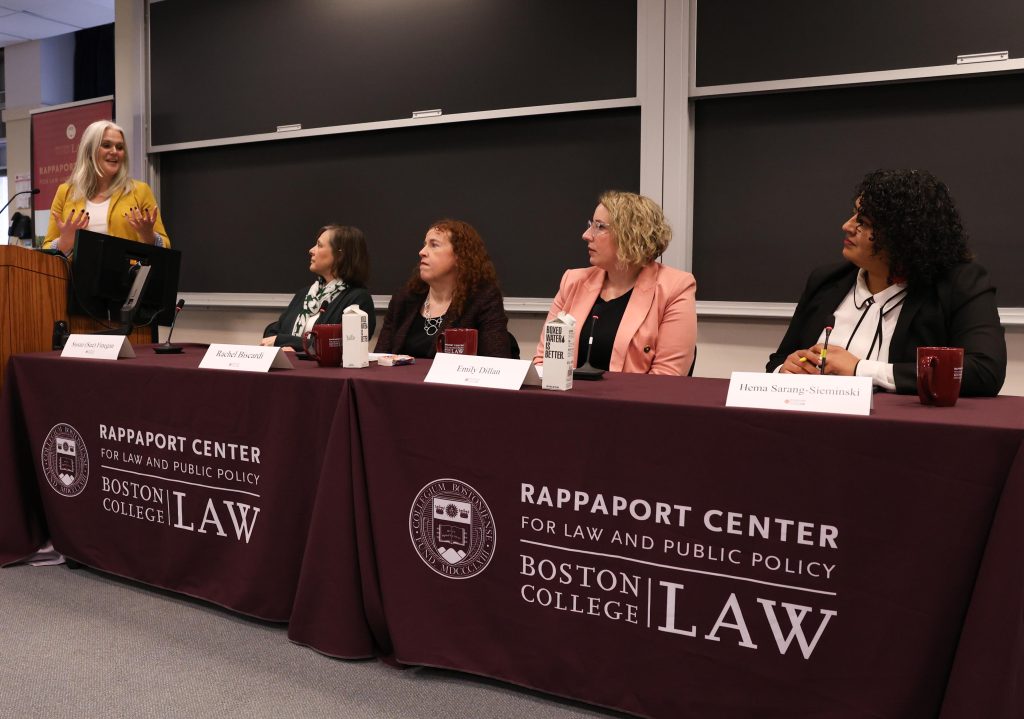For the widespread and malignant issue of domestic violence, the legal system is woefully underequipped, according to Assistant Clinical Professor Claire Donahue, director of the BC Law Family Justice Litigation Clinic.
Donahue introduced the latest Rappaport Center for Law and Public Policy panel, “Domestic Violence Laws and Policies: Past, Present, Pending, and Potential,” on February 26 by drawing on her experience as a public defender and her many years in family law practice. “Our criminal justice system does a sloppy job of understanding the various motivations, dynamics, and needs that lead to accusations of domestic violence and which inform state responses to [the issue],” she lamented during her introduction.
She noted the “disturbing binary” of states and their domestic violence laws, wherein they tend to either ignore domestic and interpersonal violence or, worse, “weaponize it against the very families and communities who are so burdened” by that violence. That’s a particularly difficult fact to swallow given that more than one in three women and one in four men in the United States have experienced rape, physical violence, or stalking by an intimate partner in their lifetime
The panel was moderated by Susan Finegan ’91, partner and chair of the Pro Bono Committee at Mintz. Previously, Finegan was the legal director of the Victim Rights Law Center, which provides free statewide legal services to survivors of sexual assault and domestic violence; today, she continues that work at Mintz, representing families torn asunder by domestic violence and counseling shelters and rape crisis centers on legal matters.
Speakers included Rachel Biscardi, managing attorney of the Family Law Unit at Northeast Legal Aid; Emily Dillan, law clerk with the Bristol County Probate and Family Court and former 2021 Rappaport Fellow; and Hema Sarang-Sieminski, deputy director of Jane Doe, Inc., a non-profit coalition of domestic violence programs and sexual assault victim advocacy organizations. Each of the panelists had extensive knowledge and familiarity with the family law system in Massachusetts, and some shared their own personal encounters with—and triumph over—domestic abuse and violence.
“Only 150 years ago, the Massachusetts Supreme Judicial Court issued a ruling which essentially found that beating or striking one’s wife violently is not included as part of the marriage contract,” Finegan said. “We take this for granted today but, at the time, it was groundbreaking.” Since then, policy advances in domestic violence have been made, but at an often glacial pace.
“After doing this work for over twenty years, I can tell you that our system isn’t working, and I’m glad to hear about restorative justice alternatives that actually get to the heart of the problem.”
Rachel Biscardi, managing attorney, Family Law Unit at Northeast Legal Aid
Dillan shared a heart-wrenching tale of her own experience with domestic violence: “I spent years in a cohabiting, abusive relationship, and when I left, all I wanted was justice,” she said. But she was reluctant to report the abuse to law enforcement—”A common experience among survivors”—for fear of the consequences. “I was afraid of social ostracization, afraid of the legal and social consequences for my abuser… I decided that the best way to get justice was to rebuild my life and do a damn-good job of it,” she revealed. That experience eventually led Dillan to a career in family law and a passion for survivor justice.
Dillan invoked the oft-repeated aphorism that “hurt people hurt people,” maintaining that domestic abusers often resort to violence because of wider social inequalities or previous victimization of their own. “Had there been more systems in place that could have helped me, or that could have helped my abuser, we could have put an end to our dynamic sooner,” she said.
All three speakers played a role in the passage of Massachusetts General Law Chapter 276B, a law that established a diversionary program for defendants in domestic violence cases founded on principles of restorative justice. The impetus for the change—previously, there was no pre-trial, diversionary alternative for prosecution—was largely based on experiences like Dillan’s: Victims of domestic violence are more likely to report their abusers if the negative impact on their lives (and the lives of the defendants) is minimized.
Biscardi shared some words of wisdom for law students exploring a career in family law: “You’re going to have bad days—you may have more bad days than you have good days—but when you stand next to a victim and give them a voice, more of a voice than they had before… that’s the greatest feeling in the world,” she said.
When she entered the family law field, Biscardi was skeptical of restorative justice as a workable alternative to the traditional justice system. Domestic violence was a crime, in her eyes, that deserved to be treated and punished as such, no exceptions. “Now, after doing this work for over twenty years, I can tell you that our system isn’t working, and I’m glad to hear about restorative justice alternatives that actually get to the heart of the problem,” she said.
Sarang-Sieminski admitted that the coalition-based, community-oriented approach to restorative justice in domestic violence contexts is often messy, but necessary to effect meaningful change. After manning a domestic violence hotline, she learned that survivors of abuse are often subjected to (and made to relive) trauma that they are trying to put behind themselves. “Survivors experience deep pain and harm from a betrayal by people they love, but they are often equally subjected to pain by the systems they are forced to interact with” in their pursuit of justice, she said.


